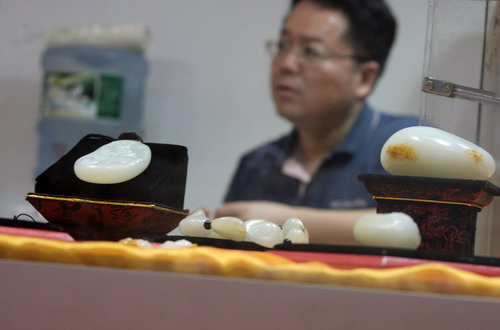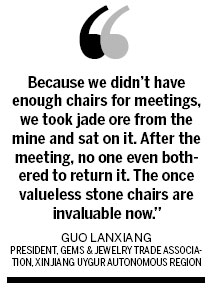Economy
Jade too expensive following price surge
Updated: 2011-07-25 10:17
By Shao Wei and Li Woke (China Daily)
|
 |
|
An investor checks the price of a Hotan jade ornament at a store in Panjiayuan, southeastern Beijing. Hotan jade prices have increased 10,000 times in China over the past 18 years. [Photo / China Daily] |
Urumqi - On any big street in any city in the Xinjiang Uygur autonomous region, such as Urumqi, Kashgar or Korla, it is common to see Uygur people peddling jade to the crowds of tourists.
In addition to the tourists, there are more than 3,000 institutional investors and countless other speculators in the region paying particular attention to the market in white Hotan jade.
"At least 50 percent of investors are from inland provinces, especially Henan province," said Guo Lanxiang, president of the Gems & Jewelry Trade Association of Xinjiang Uygur autonomous region.
Hotan jade has risen about 10,000 times in price from 30 years ago, according to Guo. "The price of one kilo of Hotan jade in 1993 was 1,500 yuan ($232). Now a kilogram of Hotan jade may cost from 1 million to 10 million yuan.

Guo said there were two main reasons for the frenzy. On the one hand, the stock market and real estate are no longer returning the profits they once did. On the other hand, people are becoming better off and can afford to collect the precious stones.
Liu Rong, the owner of a shop selling jade ornaments in Panjiayuan of southeastern Beijing, gave an additional reason for the rise in value: So many people in China and abroad have bought it for speculative reasons there is simply less around to buy.
"I cannot afford to buy more Hotan jade now as prices are so high. The jade accessories in my store were all collected 10 years or so ago," said Liu.
Some jewelry stores have even started to sell fake Hotan jade or replicas because of depleting jade resources in Xinjiang and huge market demand, said a Panjiayuan official who declined to be named.
According to traditional Chinese culture, jade brings happiness and luck to its owners and keeps evil away.
Hotan jade, renowned for being white and flawless, was once abundant in the lofty Kunlun Mountains of Xinjiang. The public are not permitted access. They search for lumps of rough jade that have been carried down by summer torrents to the foot of the mountains or to the adjacent plains.
However, most of the jade has now gone. Only a few kilograms of good quality jade are found every year. The scarcity makes it more valuable.
"Even the price of mountain jade, which is generally of poorer quality that that found in the rivers, is more than 300,000 yuan a kilogram," Guo said.
Data from the China Gems & Jewelry Trade Association showed revenue from selling Hotan jade rose to 18 billion yuan in 2010. This year it is expected to total more than 20 billion yuan.
"The price of jade in Xinjiang began to shoot up after the 2008 Beijing Olympics. The medals awarded to the world's best athletes incorporated polished jade," said Guo.
She recalled that in the 1960s, when she worked as an assistant medical aide at a jade ore mine on Kunlun Mountains, local people treated Hotan jade "as valueless as ordinary stones".
"Because we didn't have enough chairs for meetings, we took jade ore from the mine and sat on it. After the meeting, no one even bothered to return it. The once valueless stone chairs are invaluable now," she said, laughing.
Hotan jade has a history of at least 7,000 years in China but it only became valuable in recent years.
"I don't think the price of jade will drop in the coming years. As the government recently instituted reforms to regulate jade mining and prohibit commercial digging along forests and riverbanks, jade will become scarcer and therefore more precious," Guo said.
Store owner Liu added: "I don't know whether Hotan jade prices will drop in the future, but my business is getting harder and harder these days as fewer and fewer people can afford to buy it."

Specials

Turning up the heat
Traditional Chinese medicine using moxa, or mugwort herb, is once again becoming fashionable

Ciao, Yao
Yao Ming announced his retirement from basketball, staging an emotional end to a glorious career.

Financial sector short of talent
Lack of skilled professionals in Shanghai inhibiting the city's development as a financial hub